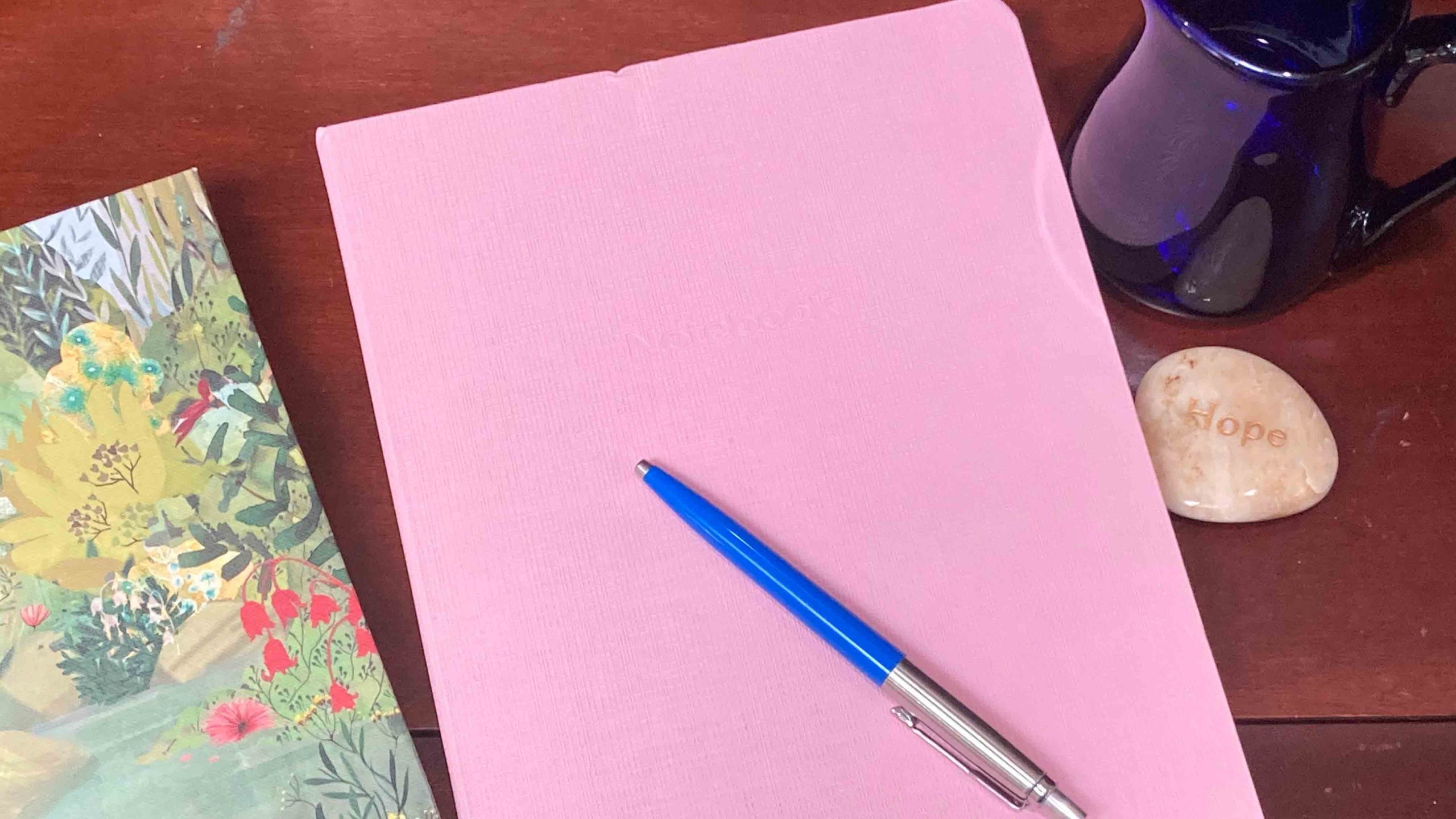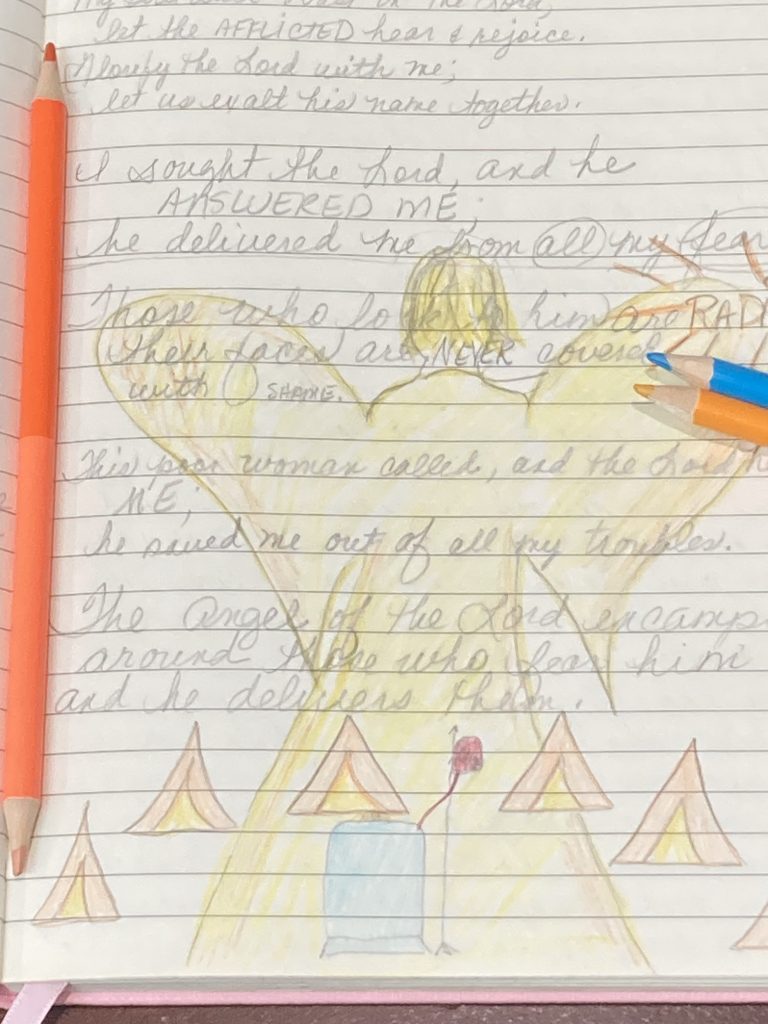 Journaling: From Dark Days to Hope
Journaling: From Dark Days to Hope
How journaling on a cancer journey can help you find hope.

Patti Hoover
(Hope Has Arrived Support Staff)
Some people have kept a journal their whole lives. I was never consistent with journaling. But that changed when my world turned upside down with my doctor’s words: “Have you seen the pathology report on your record?” I had and I was terrified!
The cancer was aggressive and growing. I couldn’t think straight, and I needed to somehow make sense of what was happening, what I was feeling and what I needed to do.
Enter the practice of journaling on my cancer journey.
What is journaling?
There may be many different definitions, but that really didn’t matter to me at the time. I just needed to get my thoughts and emotions out. And that’s what journaling is: a safe space to write down your honest thoughts about what you are experiencing.
Journaling on a cancer journey can be done in a book made especially to be a journal. You can use a spiral notebook you pick up at the dollar store or a fancier one from Barnes and Noble. It can be done on a computer. There is no right or wrong way to journal. You just need to get started, and for some people that is the hardest part.
7 helpful thoughts about journaling
Here are a few thoughts that might be helpful to you as you start journaling:
-
Just write.
Ask yourself, “What am I feeling?” Some people have trouble understanding their emotions so this may not come easily at first. But as you write you may find feelings, fears and worries come out and become clearer. One of my entries began simply with, “I am so sad.” Allow yourself to “get in the flow.” Perhaps you will find your thoughts slowing down. You may find, as you journal, that you tap into deeper emotions.
-
Be honest.
This brings us to what I think is one of the most important parts of journaling: honesty. This is not the time for platitudes, polite phrases or hidden meanings. This is for you alone unless you decide to share parts of your journal with someone else. This will likely also help you to be more open with God in the process.
-
Write freely.
Don’t tie yourself to perfection or any other self-imposed rule regarding journaling. You may journal daily and then go a few weeks without writing a word. Your journal is a tool, and you decide when to use it. Forget about punctuation, spelling, or complete sentences unless that is important to you. I found writing phrases allowed me to get words down quickly without the restriction or concern about proper grammar and punctuation.
-
Keep a record of time.
Date and perhaps time your entries (and if you journal a lot, write the year). I found this helpful when I would go back and review my journal. I would also sometimes write a sentence about an important moment in my cancer journey. For example, in my journal, beside one date, I wrote, “The day I had my meltdown. Am I losing my mind?” I found it helpful to look back at this day and compare it with how I was feeling on other days. It gave me perspective.
-
Record your inspirations.
Add Bible verses, quotes you’ve found inspiring and lyrics from songs. I found these to be ways that helped me understand what I needed from God and how he was speaking to me. As I wrote out the Bible verse in my journal, “The angel of the Lord encamps around those who fear him, and he delivers them (Psalm 34:7 NIV),” I envisioned angels in tents surrounding me and a very large angel towering over me as I sat receiving the red chemo medication infusing into my body. The thought brought great peace to my heart during a very difficult situation.

-
Be creative.
I’m not an artist but it was helpful to sketch in my journal because it was almost like saying a prayer without words. In fact, I drew the angel scene above in my journal. If you journal on the computer using different fonts can help you add sentiment or emphasis to words on the screen. Since I used a paper journal, writing in large letters, using hard pressure on my pen or pencil, underlining words or drawing a box around them or using colored pencils or pens allowed me to add intensity to a soundless act. At times, the process seemed to silently release emotions.
-
Write your prayers to God.
Journaling helped me begin an honest prayer to God about what I was facing. As you are honest with yourself, you can also be honest with God about the struggles you are facing. He already knows how you’re feeling. Some people are afraid to admit they are angry with God. God created us with emotions, and anger is an emotion. God can handle your honesty and even your anger. He stands ready to help you in your time of great need, even by giving you the gift of peace in a season that is anything but peaceful.
How journaling can help you share with others
Journaling brought me a benefit that I didn’t expect. After my cancer diagnosis, I think I started journaling to understand my emotions and have a record of the journey. This was a primary benefit. However, I found it helped in another way.
Once I wrote out what was going on in my head and heart, it became clearer to me and easier to share with my husband, family, friends and even those involved in my medical care.
This was a big benefit, because those who care about you want to understand what you are going through, but often they can’t unless you can share clearly about what you are feeling. Journaling helps you do that.
To hear more about my experience with cancer, see “Sketches, Songs and a Rising Sun.”
Looking back, looking forward
Journaling has helped me look back and look forward.
When cancer entered my life, I felt somewhat hopeless. It seemed too aggressive, the statistics too daunting. I was very afraid. But God entered my dark days with Bible verses, childhood hymns, and uplifting quotes, which I incorporated in my journaling. And with each of these, he brought hope and peace to my heart.
Looking back, I can see how he wove into each day of chemotherapy and pain and worry, and brain fog, his sweet whispers of love and care.
Now when I read my journal, it lifts my heart in thanksgiving and hope. I am in awe of what God has done in my life, and journaling has been a major factor in helping me see that. Because God is in the business of giving us hope now, and especially for all eternity.
My prayer is that journaling will also help you to look back, so you can look forward with hope for whatever you are facing.
For more help on your cancer journey, see The Gift of Peace.
Need courage to face your next scan? click here
to download our free guide.
Related posts:
Note: We are not doctors and we cannot answer your medical questions. However, we welcome your questions about finding hope and knowing God.

 Journaling: From Dark Days to Hope
Journaling: From Dark Days to Hope